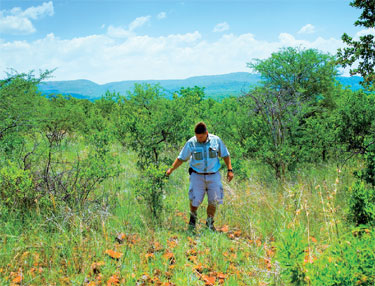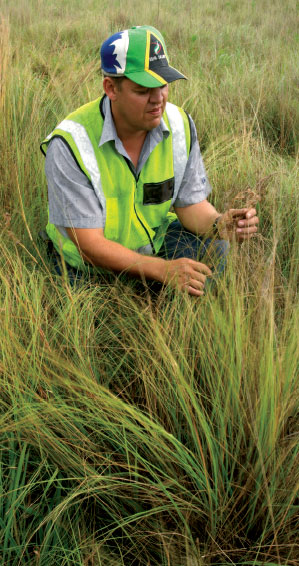|
During 2006, Group companies worked to entrench environmental management systems and ensure that we have the means to deliver against our targets. Activity focused on energy efficiency, reducing energy intensity, improving water management and continuing to evaluate operational biodiversity action plans.

Anglo Platinum’s PPRust mine is currently involved in a biodiversity offset pilot project, which is assisting international NGOs and ecologists develop a robust methodology for mitigating impact on biodiversity in one area by investing in conservation elsewhere. Three areas close to the mine were identified as potential offset areas. These are among the few examples of Savannah biome left in the area. Much of the surrounding area has been degraded through wood collection, grazing and crop production. The objective of this offset programme is to establish a community-owned reserve to maintain and, where necessary, improve the diversity and functioning of the system and provide an income from breeding threatened species of game, promoting tourism and by the establishment of a training centre. Unresolved land claims exist on portions of the offset areas, but it is believed that the claimants could be integrated into the management of the offset areas, with benefits beyond the life of the mine.
At a policy level, the Group has
been engaged, both internally
and through collaborative
partnerships, in developing
and testing new thinking on
biodiversity offset programmes,
developing norms for mine
planning and closure, which
have sustainable development
principles at their core, and
working on tools to create
water inventories.
The pace of regulatory and
legislative change continues to
be a concern in many of the
regions in which we operate.
In South Africa, a number
of operations are waiting
for water-use licences to be
issued. Forthcoming changes
in UK waste legislation have
implications for Tarmac’s quarry
waste. In addition, the effect of
a number of new EU directives
will have to be investigated.
All operating companies report
annually the number and
severity of environmental
incidents. Level 1 incidents
have only minor impacts or
short-term effects and form the
bulk of those reported. They
are a useful indicator that our
environmental management
systems are functioning
effectively. In 2006 9,313
Level 1 incidents were recorded
(9,169 in 2005). These are
managed at operational level.
The Group recorded 176 Level
2 incidents in 2006 (174 in
2005), with 137 of these in
core businesses. Many of these,
throughout the Group, were
water-related and are discussed
in more detail on Water use.
We have not experienced any
Level 3 incidents, which have
significant impacts or long-term
effects. Our business units set
internal targets and introduce
controls to reduce the likelihood
and consequences of future
incidents.
During 2006, Group operations
paid over $42,000 ($29,292 in
2005) in environment-related
fines and recorded a number
of warnings and legal actions.
Anglo Industrial Minerals paid
fines for exceeding noise
levels in China, for dust
problems in Poland and the
Czech Republic and for late
response to issues raised
during an official inspection
($3,302). In the UK, a number
of warnings and enforcement
actions were issued. Anglo
Base Metals recorded 19 minor
environmental legal actions for
the reporting period and paid
fines of $24,888.
About 86% of the Group,
measured by turnover, is
certified to ISO 14001 (or
equivalent such as the Forest
Stewardship Council). The
remaining Tarmac operations
will be certified by December
2007. New operations are
required to achieve certification
within two years.
A number of business
units received awards for
environmental performance
during 2006:
- Anglo Coal South Africa’s
Isibonelo colliery and
Anglo Platinum both won
Nedbank Green Mining
Awards.
- Vergelegen won two Mail & Guardian Greening the
Future awards for improved
environmental practice
and its work on water. It
has also been recognised
by the wine industry as a
biodiversity champion.
- Anglo American Chile and
Mondi’s Richards Bay mill
won energy efficiency
awards (see Energy use and Climate change).
- Mondi Business Paper
received a WWF Panda
Award for its efforts to
certify more than one
million hectares of forest
in Russia to the Forest
Stewardship Council
standards.
Anglo Platinum has formed
a partnership with the South
African Department of Water
Affairs and Forestry and other
mining companies active in the
eastern limb of the Bushveld
complex in Limpopo province,
to secure essential water
resources for its operations.
The De Hoop dam will service
some 21 mining companies
and approximately a million
people in several towns and
rural communities including
Polokwane and Mokopane.
Construction will commence
in April 2007 on the R5 billion
($0.7 billion) dam. Costs will
be borne by the South African
government and recouped
over 20 years from users.
Approval was granted by the
Department of Environmental
Affairs and Tourism in October
2006, after a lengthy appeal
process focused mainly around
the impacts of damming
on downstream users and
ecosystems. It is, however,
understood that not all
stakeholders have accepted the
decision and further appeals
are possible.
Construction is expected to be
completed within four years,
with the dam fully operational
by 2014. As a result of
projected water shortfalls prior
to 2014, Anglo Platinum is
considering the construction of
a dam on the Richmond farm
to source the additional water.
The Environmental Impact
Assessment (EIA) process has
commenced and focus group
meetings with stakeholders
have been planned to ensure
that all concerns and impacts
are appropriately managed.
Air quality
Emissions of sulphur dioxide
(SO2) from processes amounted
to an estimated 136,000
tonnes in 2006 due to the
inclusion of estimates of
emissions from fossil fuels.
Without the inclusion of fossil
fuels, the process emissions
would have increased from
60,198 tonnes in 2005 to
67,056 tonnes in 2006.
Emissions related to fossil
fuels arise from 24 operations.
Meaningful emission reduction
targets will be set at site level.
Anglo Platinum’s Waterval
Smelter, previously the
largest emitter of SO2 in that
business unit, further reduced
its emissions by 24% to 16
tonnes per day (21 tonnes per
day in 2005) which is within
compliance requirements. Seven
stationary monitoring stations
record SO2, particulate matter
and meteorological data on a
continuous basis. There were
only three exceedances of the
hourly SO2 guideline of
135 parts per billion.
Anglo Platinum’s Paardekraal
and Mfidikwe monitoring
stations recorded most of
the high particulate matter
concentrations. The most
significant sources of these
emissions at Paardekraal are
the tailings dam, unpaved
roads, crushers and domestic
coal burning, while the key
source at Mfidikwe appears
to be domestic coal burning
during early mornings and late
evenings in winter.
Anglo Platinum has invested
R45 million ($7 million) in a
wet scrubber to further control
boiler emissions and improve
local air quality.
Land use
management
Land used by operations for
mineral extraction, processing,
infrastructure and industrial
use was 86,203 hectares at
year end. This total excludes
land used by Hippo Valley and
Exxaro, both of which had by
then left the Group. Mondi
had 1,9 million hectares of
land under company charge
in its South African forests
and the logging area in the
Komi Republic in Russia. Anglo
Platinum owns large tracts
of land but is presently using
a relatively small section for
mining and infrastructure.
Land rehabilitation is an ongoing
activity and all operations are
required to review regularly
and update their closure plans,
which must be costed. A
mine closure toolbox, which
integrates social, environmental
and economic aspects of
closure, is being tested at
operational level. Anglo Coal
has fully rehabilitated 1,780
hectares of the 15,807
hectares disturbed for mineral
extraction. A rehabilitation
project at Goedehoop colliery
was completed and downstream
water quality and the
surrounding flora and fauna
are being monitored.
At Anglo Base Metals’ Loma
de Níquel site in Venezuela,
various restoration techniques
are being tested to speed up the
regrowth of vegetation on land
disturbed by its nickel mining
operations. Revegetation is
particularly challenging on steep
slopes, where young plants are
easily washed away in heavy
rain. The techniques being
tested include using mesh over
the topsoil and compost to hold
young plants and grass seed in
place and, on very steep slopes,
the plants are grown in bags
of soil which are anchored for
stability.
Loma de Níquel sources
plants for rehabilitation from
a community nursery which it
helped to establish.
Environmentalists are studying
natural biodiversity and indexing
species for their importance in
reforestation.

Anglo Coal South Africa has an active land rehabilitation programme. Ecologist Johan van der Walt inspects a rehabilitated pit area at Kriel colliery where grass species have started to diversify.
|